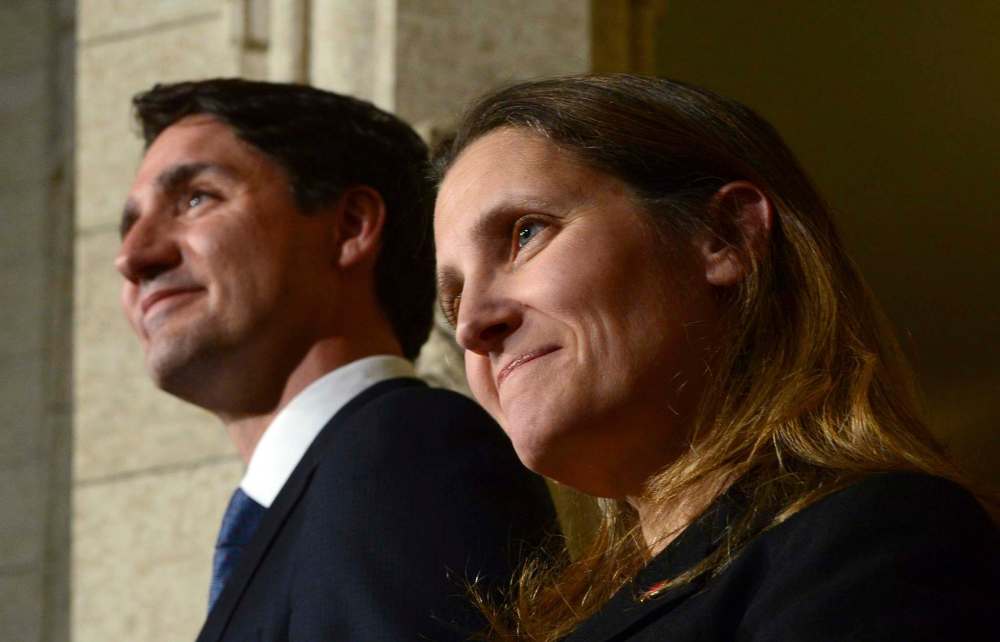Freeland’s overlooked Prairie roots
Advertisement
Read this article for free:
or
Already have an account? Log in here »
To continue reading, please subscribe:
Monthly Digital Subscription
$0 for the first 4 weeks*
- Enjoy unlimited reading on winnipegfreepress.com
- Read the E-Edition, our digital replica newspaper
- Access News Break, our award-winning app
- Play interactive puzzles
*No charge for 4 weeks then price increases to the regular rate of $19.00 plus GST every four weeks. Offer available to new and qualified returning subscribers only. Cancel any time.
Monthly Digital Subscription
$4.75/week*
- Enjoy unlimited reading on winnipegfreepress.com
- Read the E-Edition, our digital replica newspaper
- Access News Break, our award-winning app
- Play interactive puzzles
*Billed as $19 plus GST every four weeks. Cancel any time.
To continue reading, please subscribe:
Add Free Press access to your Brandon Sun subscription for only an additional
$1 for the first 4 weeks*
*Your next subscription payment will increase by $1.00 and you will be charged $16.99 plus GST for four weeks. After four weeks, your payment will increase to $23.99 plus GST every four weeks.
Read unlimited articles for free today:
or
Already have an account? Log in here »
Hey there, time traveller!
This article was published 12/01/2017 (3220 days ago), so information in it may no longer be current.
It is rarely noted in the news that Canada’s new minister of foreign affairs has Prairie roots.
The news items following Chrystia Freeland’s appointment this week have been filled with her considerable accomplishments, from being a Harvard graduate and a Rhodes Scholar to having a career in Moscow, London and New York as an influential journalist and writer of such books as Plutocrats: The Rise of the New Global Super-Rich and the Fall of Everyone Else, which landed on the New York Times bestseller list.
But there was scant mention of Peace River, Alta. Freeland frequently mentioned her birthplace, and the family farm there, during the two years I worked a few feet away from her in Toronto in the early 2000s.

It’s a part of her background as important as her deep knowledge of the United States and Russia as she undertakes the job as Canada’s top diplomat, representing our country to the world.
Freeland was deputy editor of the Globe and Mail and my boss when I was its national editor.
She was then what she appears to be now — full of energy, ambitious, smart and absolutely driven to succeed. She’s the kind of person you want on your side in a fight or, say, in a difficult negotiation with an aggressive Trump administration. Feisty Western Canadians would recognize those traits as homegrown.
Freeland kept going, no matter the challenge. She got the Globe job about the time she turned 31, a young woman parachuted from the Financial Times in London into a senior role at Canada’s national newspaper, a job that would normally go to a much older person.
It was a rough ride. She was portrayed as a brainless kid by some of the crusty old reporters at the paper who were not known for praising their bosses in any event.
If the criticism bothered her, or her self-confidence wavered, I never saw it. She was brought in as part of an effort to modernize a stuffy old newspaper facing new competition from the upstart National Post, and she was up to the task.
On the morning of Sept. 11, 2001, she pulled herself out of a meeting with publisher Philip Crawley after the first airplane crashed into the World Trade Center, and she was quickly directing coverage of the biggest news story any of us had ever seen. She stayed in charge for days, as editor Richard Addis was stranded in Great Britain while air travel was stopped around the world.
Freeland tended to do things her own way. After giving birth to her first child, she took off only a few weeks and was soon back in her office, complete with all the equipment needed to express breast milk with minimal interruption to her workday.
That drive soon took her elsewhere, to work for Thomson-Reuters and the Financial Times in New York. She came back to Toronto in 2013 to enter politics and won the riding Bob Rae had vacated. She’s had the same meteoric rise in politics that she had in journalism.
Her Toronto home, and career around the world, could leave the impression she is a sophisticated globetrotter and always has been.
There is no doubt about her global credentials. But the main thing I remember about her is when she would stop by my desk to mention something about Alberta.
I arrived at the Globe from Edmonton, so perhaps it’s natural she would do so. But she could have just as easily shown off by talking about Moscow, London, New York, Boston or any of the other exotic places she had lived and worked.
But she remembered the West, a part of the country that helped form her character. It’s a background that will serve her well as a fully rounded representative of Canada abroad.
Bob Cox is the publisher of the Free Press and chairman of the Canadian Newspaper Association.



